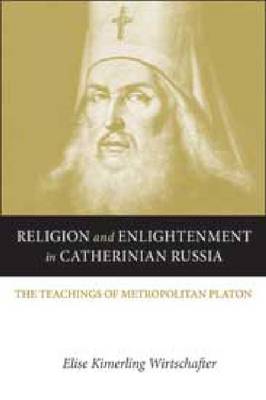NIU Series in Slavic, East European, and Eurasian Studies
5 total works
Religion and Enlightenment in Catherinian Russia
by Elise Kimerling Wirtschafter
A category of persons best defined by what they were not, the raznochintsy—"people of various ranks" or "people of diverse origins"—inhabited the shifting social territory between nobles and serfs in preindustrial Russia. Neither merchants nor clergy nor military servicemen, they may have been by occupation administrative clerks, teachers, artists, retired soldiers, or street vendors. In official society, they were outsiders.
In this first major study of the raznochintsy, Wirtschafter draws on a rich array of archival, legal, administrative, and public sources to show how this important but elusive category functioned in Russian society from the time of Peter the Great to the late nineteenth century. Challenging the traditional image of a rigidly hierarchical social structure, her conclusions indicate that there was much more mobility within imperial Russian society than historians have previously thought.
Developing a representational interpretation, Wirtschafter examines the raznochintsy as a legal, social, and cultural category. Focusing on the usages, meanings, and dynamic evolution of the category, she analyzes the origins of the raznochintsy as well as larger theoretical issues of social categorization and delimitation. Her depiction of a society where social boundaries were porous and social definitions fundamentally indeterminate provides a new perspective on some of the most stubbornly problematic themes in imperial Russian history.
The Play of Ideas in Russian Enlightenment Theater
by Elise Kimerling Wirtschafter
How did enlightened Russians of the eighteenth century understand society? And how did they reconcile their professed ideals of equality and justice with the authoritarian political structures in which they lived? Historian Elise Wirtschafter turns to literary plays to reconstruct the social thinking of the past and to discover how Enlightenment Russians understood themselves.
Opening with an illuminating discussion of the development of theater in eighteenth-century Russia, Wirtschafter goes on to explore dramatic representations of key social questions. Based on an examination of nearly 300 secular plays written during the last half of the century, she shows how dramas for the stage represented and debated important public issues—such as the nature of the common good, the structure of the patriarchal household, the duty of monarchs, and the role of the individual in society.
Wirtschafter presents a striking reconstruction of the way educated Russians conceptualized a society beyond the immediate spheres of household and locality. Seeking to highlight problems of "social consciousness," she asks what Enlightenment Russians thought about social experience—and how their ideas related to actual social relationships in a society organized around serfdom and absolute monarchy. She portrays Russian Enlightenment culture on its own terms, while at the same time shedding light on broader problems of social order and political authority in imperial Russia.
How did enlightened Russians of the eighteenth century understand society? And how did they reconcile their professed ideals of equality and justice with the authoritarian political structures in which they lived? Elise Wirtschafter turns to literary plays to reconstruct the social thinking of the past and to discover how Enlightenment Russians understood themselves.
Opening with an illuminating discussion of the development of theater in eighteenth-century Russia, Wirtschafter goes on to explore dramatic representations of key social questions. Based on an examination of nearly 300 secular plays written during the last half of the century, she shows how dramas for the stage represented and debated important public issues-such as the nature of the common good, the structure of the patriarchal household, the duty of monarchs, and the role of the individual in society.
Wirtschafter presents a striking reconstruction of the way educated Russians conceptualized a society beyond the immediate spheres of household and locality. Seeking to highlight problems of "social consciousness," she asks what Enlightenment Russians thought about social experience-and how their ideas related to actual social relationships in a society organized around serfdom and absolute monarchy. She portrays Russian Enlightenment culture on its own terms, while at the same time shedding light on broader problems of social order and political authority in imperial Russia.
In From Victory to Peace, Elise Kimerling Wirtschafter brings the Russian perspective to a critical moment in European political history.
This history of Russian diplomatic thought in the years after the Congress of Vienna concerns a time when Russia and Emperor Alexander I were fully integrated into European society and politics. Wirtschafter looks at how Russia's statesmen who served Alexander I across Europe, in South America, and in Constantinople represented the Russian monarch's foreign policy and sought to act in concert with the allies.
Based on archival and published sources-diplomatic communications, conference protocols, personal letters, treaty agreements, and the periodical press-this book illustrates how Russia's policymakers and diplomats responded to events on the ground as the process of implementing peace unfolded.
Thanks to generous funding from the Sustainable History Monograph Pilot and the Mellon Foundation the ebook editions of this book are available as Open Access (OA) volumes from Cornell Open (cornellopen.org) and other Open Access repositories.




